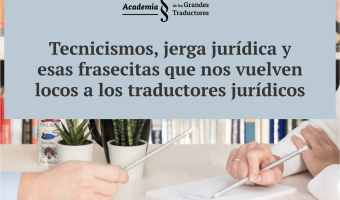By David Bustamante Segovia As a professional translator, a law student in Latin America, and a legal English student in the U.S., I tend to see many errors that arise from literal translations between Spanish and English that do not take into account judicial structure differences, among other types of differences (e.g., view of the […]
LawD Expert Insights
Plain language for clear and accessible legal translations
By Rebecca Porwit The plain language movement gained traction in the 20th century with a push to simplify legal and government documents. In 1979, the Plain English Campaign was founded in London to combat “gobbledegook, jargon and legalese.” This was also the year Richard Wydick’s Plain English for Lawyers was published. But why is clear […]
Terms of Art, Legal Jargon, and Those Phrases that Drive Legal Translators Mad
By Ruth Gámez and Fernando Cuñado (Traducción Jurídica) This post summarizes our presentation at the most recent ATA annual conference. ATA’s annual conference is the largest meeting of translators in the world, and it was an honor to have our proposal selected as one of the conference sessions. If you are interested in the issues […]
Revelia: o que é? Como se fala em inglês?
Por: Bruna Marchi Para quem não é formado em Direito, o termo “revelia” pode ser desconhecido. Para quem estudou Direito, a questão é saber como se fala “revelia” em inglês. Para facilitar, estruturei esse texto em perguntas e respostas. Comecemos, então. Afinal, o que significa essa tal “revelia” que leio nos jornais e vejo no […]
Highly civil law – the other approach to contract law
This material first appeared as a post on the author’s blog Tip of the Tongue, here. Published with permission from the author. By Stephen Rifkind Sometimes a person visits another family or country and discovers that an alternative way of doing something actually has many advantages. That was my feeling after an amazing two-hour webinar […]




